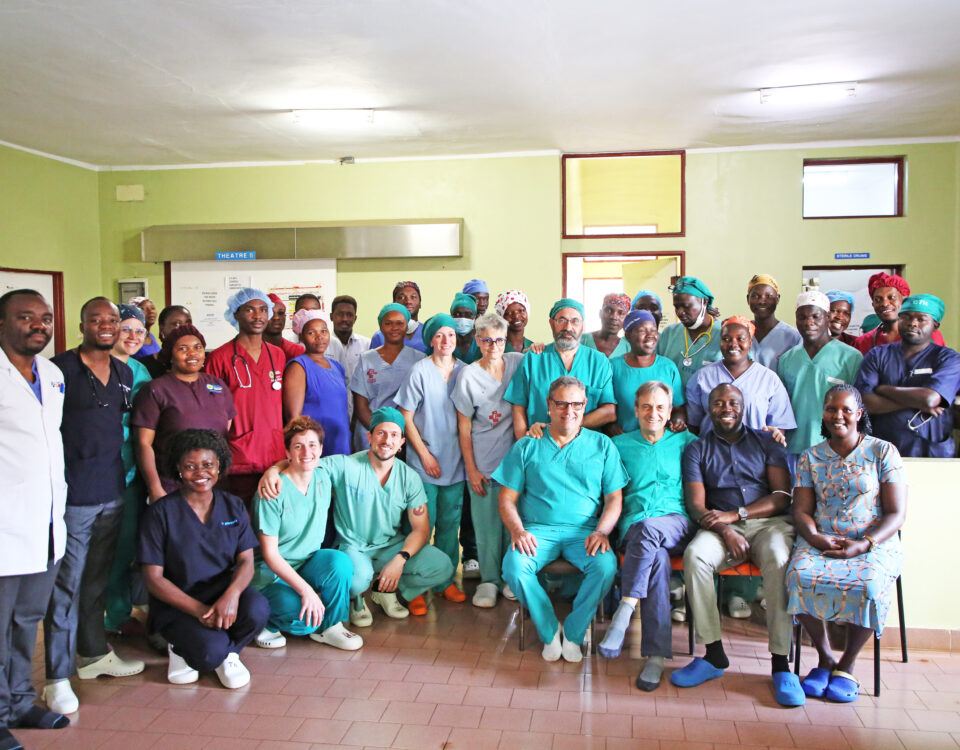This year alone, Lacor Hospital has received several patients on the verge of death after an encounter with violent gangs. Joel is yet another patient we treated with this same experience.
Joel, a young man from Adjumani District, is the second youngest of eight children. He is full of life and energy. He loves exploring beyond the familiar and chasing moments that make him feel alive.
Growing up is a beautiful mess of discovery. We stumble, we learn, and we chase the excitement of the unknown. Childhood is all about decoding the world, learning to speak, to walk, and to wonder. But adolescence is different. That is when curiosity meets courage, and every night feels like an invitation to explore. One night, that same spirit led him and a few friends to a local disco. While his family believed he was asleep, Joel was dancing, laughing, and enjoying life. But as the music ended and the group made their way home around 1 a.m., the night took a cruel turn.
A group of strangers appeared from the dark, demanding their clothes, phones, and shoes. When Joel and his friends refused, the threats turned violent. His friends ran for their lives, but Joel was not so lucky.
“They beat him, cut him on the head, and even tried to slit his neck,” his sister Mary recalled. “One of them axed his knee. They left him bleeding, stripped of everything.”
At around 2 a.m., Joel’s family was woken by one of the friends who had escaped the attack. Panic set in immediately. They rushed to the scene, but all they found was blood, no Joel, and no sign of life.
“My spirit left me,” Mary said. “I kept asking, Is he dead? Did they take him? Where is Joel?”
Then a stranger arrived with a small piece of hope that the police had taken a badly injured young man to Pagirinya Health Centre II. The family ran there and found Joel, barely conscious, surrounded by two nurses trying to stop the bleeding.
“The look on their faces told me everything,” Mary said. “It was bad.”
Bad that they could not wait till morning; they had to rush him to Adjumani Hospital, and by morning, be referred to Lacor hospital for specialized treatment. But first, they had to stop at Gulu Regional Referral Hospital for a CT scan assessment. They now must travel to a place the family had never visited before.
Mary, her parents, and her brother made the long journey together across the Nile to Gulu.
When they finally reached Gulu, the scans were done, and they showed that Joel had a broken femur.
 And the deep cut on his left knee will take a long time to get him back on his feet. That was the beginning of a long two- month hospital stay with us in the hospital.
And the deep cut on his left knee will take a long time to get him back on his feet. That was the beginning of a long two- month hospital stay with us in the hospital.
But that would be too long a time to leave the other children back at home alone, so Mary had to stay back with her brother in the hospital while their parents returned home to care for the younger ones.
Two months on, Mary watched every dressing and the steady healing.
We met Joel and Mary during our quarterly Patient Satisfaction Survey in the Trauma Ward. Their closeness was clear, and the fear that once filled Mary’s eyes had softened into gratitude. Joel is now walking —though still on crutches —and alive, healing, and hopeful.
Across Uganda, many young people face similar violence. According to the Uganda Police Annual Crime Report (2023), more than 30,000 cases of assault and violent crime were recorded that year. Many of these involve young men in rural and peri-urban areas. For every case reported, many more go unrecorded. Survivors rarely get justice, and families often bear the pain in silence.
Hospitals like Lacor hospital and Gulu Regional continue to receive increasing numbers of trauma victims, most of them young people.
A 2022 Ministry of Health review shows that injuries and violence are now among the top five causes of hospital admissions in Uganda, with road accidents and interpersonal violence leading the list.
What Joel went through is not his alone. It reflects the experiences of countless young people across the country. Many do not survive. Many families never get answers. Many attackers walk free.
Let Joel’s recovery be a call to action for safer nights, stronger systems, and stories that end in healing, not heartbreak. It should remind teens to be careful when trying new things, parents to keep a close eye on their children, and those who do wrong that the law will catch up with them. Justice might take time, but it always comes.
We do not encourage victim blaming, but rather advocate for every human being to enjoy the rights and privileges to experience life without violence, fear, and intimidation.


